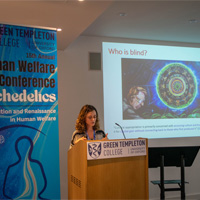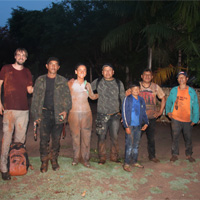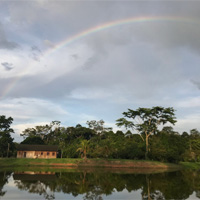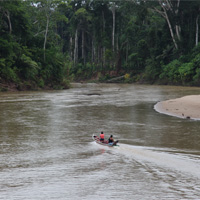By Mark Schunemann and Fê Gebara
On the 15th of May 2023, Green Templeton College (GTC) hosted its 15th Human Welfare Conference, “Psychedelics: Revolution and Renaissance in Human Welfare”. Chaired by anthropologist Austen Fisher, it was the first college-led academic conference on psychedelic research and practice at the University of Oxford. Situated around the eighteenth-century Radcliffe Observatory and “The Open Arms” (a beautiful Victorian building acknowledged as a source of inspiration for medical students, physicians, scientists and academics), GTC is home to students, researchers, and professionals from business, medicine, the humanities and social sciences. With an interdisciplinary practice-oriented approach, GTC hosted its cutting-edge 15th Human Welfare Conference.
From archaeology to social work, therapy to ceremony, cognitive enhancement to metaphysical research, scholars and practitioners were cross-pollinating important insights – as they always have done in this field – while addressing questions unique to contemporary predicaments. Some of these predicaments include: how do we know how far psychoactive plants stretch back into human history? What is medicine and what is the role of indigenous ontologies and rituals in psychedelic practice? Need psychedelic integration include metaphysical nesting? Is the MDMA therapy experience equivalent to love or mere euphoria? How do we mitigate for abuses of power in the space, and to what extent are these intrinsic to a lack of psychedelic care infrastructure? Could we integrate permaculture worker cooperatives into this context? Can psychedelics help us move towards more sustainable futures?
The day started with Professor Robert Arnott, Associate Fellow of Green Templeton College, archaeologist and medical and disease historian, showing how antique is the use of psychoactive plants among different cultures, with special focus on the Mediterranean. In the 19th century, researchers noticed that base-ring juglets resembled closed and inverted poppy flowers, seemingly suggesting that these vessels could have been used for storing opium. Recently, an analysis of organic residue in eight juglets found at Tel Yehud, including some from Cyprus, has confirmed the presence of opium residue. He revealed that this discovery provides the earliest evidence of psychoactive plant use in archaeological records. It predates the well-known discovery of cannabis at Tel Arad by approximately 600 years.
On a global level, anthropologist and writer Dr Fê Gebara (one of the writers), reminded us of bio-epistemicide, that is, the “erasure, devaluation, or obliteration of traditional knowledge and ways of knowing about biological beings”, including psychoactive plants. Looking at the case of ayahuasca, she pointed out the importance of critically examining the limits of the standard pharmacological approach, which emphasizes objectivism and reductionism to the detriment of indigenous practices, ontologies and epistemologies, and subjectivity per se, questioning “who is blind?” in such a context. During an ecological crisis, the call to learn from indigenous and other knowledge guardians that consider plants to be conscious, as opposed to extracting not only their medicines but even their very scientific systems is an important call to action while transitioning to a more integrative medicinal context focused on the welfare of all beings, not just humans.
After a welcome break to integrate all the historical and ancient information that was shared, Dr Peter Sjöstedt-Hughes, a philosopher of mind and metaphysics, research fellow and lecturer at the University of Exeter (where he has co-founded the Exeter Psychedelic Research Group) hypothesised the benefits in better including metaphysics, not just in interpreting psychedelic experience, but even while treating patients with these drugs. He presented an intelligible schema (the “Metaphysics Matrix”) and discussion of metaphysical options at the integrative phase of the therapy that would include a new Metaphysics Matrix Questionnaire (“MMQ”). Peter’s hypothesis questioned whether our own autochthonous metaphysics’ may help to integrate and lengthen the benefit of psychedelic experience, demonstrating the potential and mutually beneficial fusion of philosophy with practical science.
After lunch, the well-known Dr Ben Sessa, coiner of ‘psychedelic renaissance’, and one of the first doctors to develop the field of contemporary psychedelic research in the UK and the co-founder and Head of Psychedelic Medicine at Awakn Life Sciences in Bristol, showed the benefits of different psychedelics, but especially ketamine, MDMA and psylocibin for a wide range of psychiatric conditions. While describing his practice with MDMA he shared that people often ask him: “Is this what love feels like?” He then continued: “On the one hand you may wish to say no, it’s just a drug experience. But then I think about it: they feel no fear, they feel safe, they feel confident and joyful – so I tell them, yes, this is how to love and be loved feels like.” The fact that falling in love and psychedelics experiences normally cannot be put into words, already says a lot about the intersections of these two qualities of human life. And yet we were left wondering: is there not more to love than experience?
On a glocal level, the Organic Horticulturist and Permaculture tutor, educator and researcher, and connoisseur of mushrooms, Darren Springer (a.k.a. ‘Darren Le Baron’) reminded those at the conference that creating community bonds of trust helps to potentiate any confident individual who chooses to explore psychedelic space. He presented about the importance of the San peoples and other African cultures and how their practices, such as the Kung healing dance, go beyond the use of psychoactive plants, showing that the experience of altered states of consciousness is key to healing and is essentially non-verbal or even beyond words: what a lot of people call “ineffable experience” at the psychedelic world.
Following Darren, clinical psychologist Dr Rosalind Watts, the founder of ACER Integration, gave us the breakthrough of the Conference. She changed her presentation last minute to talk about the intrinsic limits of the profession as a former NHS healthcare worker and former clinical lead on the Psilocybin for Depression trial at Imperial College London. She exposed the real problems of the psychedelic boom, touching on the main reasons why we are all desperately looking for healing, such as our lack of lineage and the capitalist system we live on. She brilliantly expressed that this radical optimism of the “psychedelic renaissance” is being driven by a lot of powerful interests and corruption, and that we cannot have time to learn from the process if all happens in such a fast pace. As Ros pointedly asked, “what are some of the risks we find in the garden when we are incubating the seed?” metaphorically showing how kudzu, a perennial vine from the beam family, can be quite a killer, overtaking and growing over anything in its path, out of control quickly.
Yet, on a local level, Watts asked the difficult question: can the currently understaffed, overstressed, personality-worshipping structure of public psychiatry and psychotherapy in the UK contain what are seen by most as narrative-shattering mystical experience? Is this a structure which invites abuse? Although hearing her talk gave the refreshing odour of a priest denouncing her own church, as she was opening the “black box” of psychedelic research and practice, she was able to conclude presenting different solutions that could help us in moving forward. They include: investing more energy and time in community work, beginning rather than ending with planting trees, being in nature, reconnecting with elders and honouring sacred lands. All of these are certainly needed and healing!
The final panellist was Dr David Luke, Associate Professor of Psychology, at the University of Greenwich and the co-founder of Breaking Convention, the major international psychedelic conference in the UK. David’s presentation covered important points related to the increased consciousness that psychedelics can generate in relation to living and non-living entities and how this can prompt pro-environmental behaviours. He showed a lot of different evidence to back the potential benefits of psychedelics for ecology and psychology, such as enhancing the biophilia, changing behaviour, instigating creative problem solving and increasing interspecies communication.
Finally, Kenneth Shinozuka, a PhD student in neuroscience at the Centre for Eudaimonia and Human Flourishing at Oxford University and the President of the Oxford Psychedelic Society, moderated the final panel with Peter, Fê and Ros where the advantages and disadvantages of making pharmaceutical psychedelics available to the wider public were debated. Inspired by the unsettling urge that love is as important as psychedelics and as much action as it is passion, Mark Juhan (the co-author of this post) asked whether Abraham Joshua Heschel’s statement – “Within our awe we only know that all we own we owe…It is not a thing that lends significance to a moment, but a moment that lends significance to a thing” (Heschel, Thunder in the Soul, 2021) – might provide a good point to reflect on all of this. Over-emphasis on the thing, whether the molecule, the drug or the plant, is not what creates a momentous significance. Any two things can be alike, but two moments only have a contemporary in eternity. During a critical cultural moment of mass extinction and authoritarian backlash, perhaps it is important to consider what things we really need to truly connect ourselves to one another and to all others.
“Bringing indigenous leaders, spiritual teachers, and philosophers into conversation with entrepreneurs, medical professionals, and policymakers, psychedelics represent untapped worlds of potential with significant and far-reaching consequences. In hosting Oxford’s first college-led conference on psychedelics, GTC demonstrates its commitment as an innovative, interdisciplinary, and practice-oriented institution while signalling society’s growing acceptance of these extraordinary substances.” – Austen Fisher, Chair of GTC’s 2023 Human Welfare Conference “Psychedelics: Revolution & Renaissance in Human Welfare.”
















